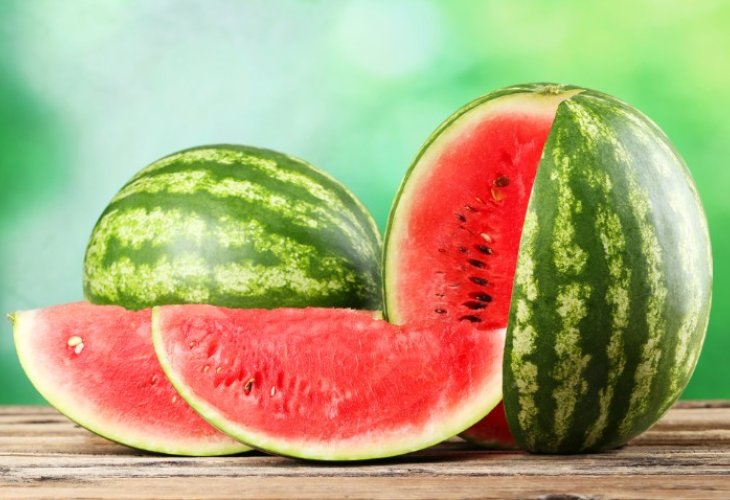Refreshing Article: 7 Wonderful Benefits of Watermelon
Should you eat the seeds, what is the peel used for, and how do you pick a successful watermelon? This article will enlighten us on the health benefits of the red, sweet, and beloved vegetable (yes, vegetable).

1. Full of Health, Low in Calories
In 100 grams of watermelon, you can find 92 grams of water, 0.61 grams of protein, 8 grams of carbohydrates, and 0.15 grams of fat. Watermelon contains important vitamins and minerals: 100 grams of watermelon contains 0.24 mg of iron, seven mg of calcium, 0.4 grams of dietary fiber, 112 mg of potassium, and 11 mg of phosphorus. Watermelon has a nice amount of beta-carotene, vitamin B5, vitamin B3, vitamin C, lycopene, and other antioxidants.
2. Prevents Dehydration
Watermelon contains a high amount of fluids. Since it tastes sweet, one can easily consume a large amount of fluids, making it especially suitable for those who do not like to drink enough water during the summer.
3. Aids Digestion and Relieves Constipation
Due to its water content and dietary fibers, watermelon helps prevent constipation and promotes regular bowel movements. Watermelon is made up of 92% water, which is full of important electrolytes for health.
4. Protects Against Heart Disease and Cancer
Watermelon contains a high amount of antioxidants, especially lycopene, which is considered one of the most powerful antioxidants of all carotenoids. Antioxidants are important for delaying cancer processes and reducing oxidative damage. Studies indicate that high lycopene intake is linked to a reduced risk of preventing gastrointestinal and prostate cancer.
Additionally, watermelon is a vital source of vitamin C, a strong antioxidant that helps fight against the formation of free radicals.
5. A Natural Remedy for Kidney Stones
Kidney stones are essentially salts that consolidate into crystals on the inner lining of the kidneys. Watermelon is an effective natural remedy against kidney stones because it is high in water, promotes urination, and releases substances from the kidneys before they form a stone. Watermelon is also rich in potassium and lycopene, which greatly contribute to kidney health and strengthening.
6. Seeds, Peel, and Juice – Full of Health Benefits
Watermelon seeds contain iron, zinc, protein, and fiber, and it is highly recommended to eat them too.
The peel of the watermelon helps treat skin fungi. In cases of skin patches caused by fungi – rub the skin with the watermelon peel.
Watermelon juice is very helpful in cases of heart disorders, blood vessels, kidney stones and sand, edema, preventing dehydration in cases of diarrhea, intestinal inflammation, vomiting, and nausea.
7. A Healthy Substitute for Traditional Desserts
Watermelon is very filling and sweet, but does not contain a high amount of calories or fat and therefore can be a wonderful substitute for many traditional desserts at the end of the meal.
So, How Do You Choose a Watermelon?
1. Pay attention to the external appearance of the watermelon. A good watermelon is shiny, solid, and has a round or oval shape without distortions.
2. Where is it kept? To maintain its sweetness, the watermelon should be kept in a shaded, cool place and not exposed to the sun.
3. What do the spots signify? Watermelons can have two types of spots. A white spot indicates the place where the watermelon touched the ground, which is a natural and good spot. Another spot on the peel, usually yellow, may indicate sun damage to the watermelon. Not recommended.
4. What does the stem look like? A fresh green stem indicates that the watermelon was picked no more than three days ago, and it is fresh and recommended. A dry stem indicates that the watermelon is older and its shelf life will be shorter.
5. And the favorite traditional method: lightly tapping the watermelon. Bring the watermelon close to your ear and tap it several times using a curved hand. If the watermelon is fresh, full, soaked, and dense as it should be, you will feel the resonance intensify.

